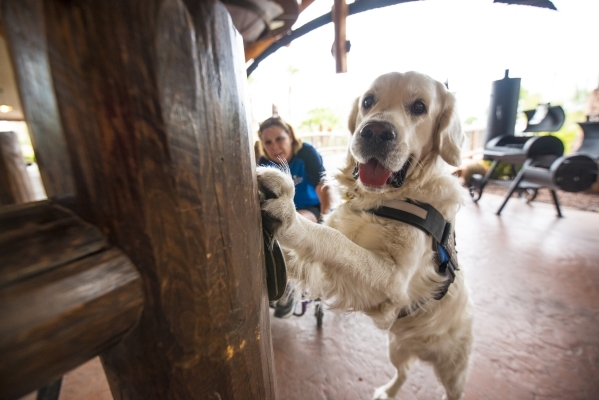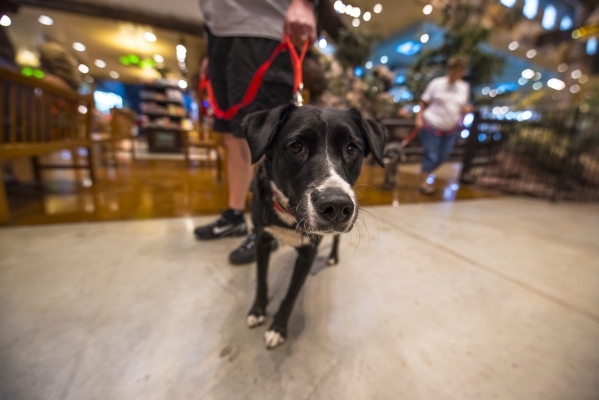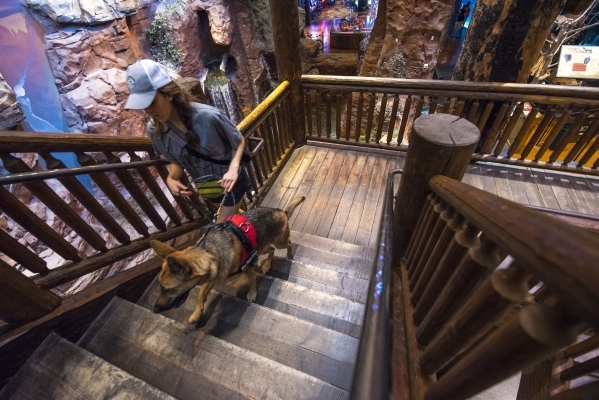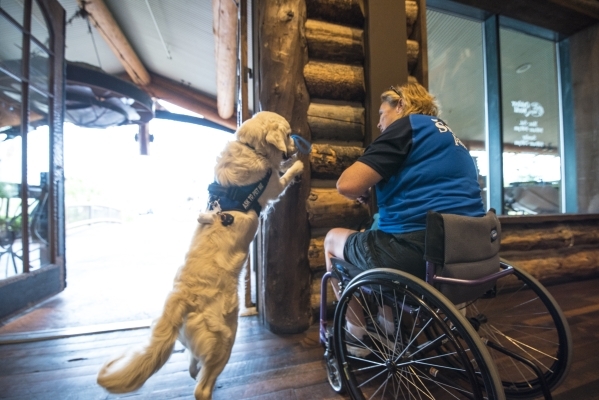Service dogs: Much more than man’s best friend
Through the eons, dogs have been regarded as man's best friend. As social pack animals, dogs require love and affection, just like humans. When provided with these necessary comforts of life, dogs have proven to be faithful guardians that can brighten the worst of days.
Since the 16th century, dogs have taken up more serious duties as service, therapy and emotional support animals. The extra assistance they can provide to individuals has created a sense of normalcy.
"When I first went through the service dog training back in 2004, I met a young girl who inspired me to become a trainer," said Janet Edberg, lead service dog trainer at Smarty Paws, 4161 N. Rancho Drive, Suite 120. "When she graduated, she said that her dog Ben made her wheelchair disappear."
Now, as a professional trainer, Edberg aims to restore a sense of regularity in people's everyday lives.
After creating a GoFundMe account, 15-year-old Jessica Lindley is on the path to training her newly acquired service dog at Smarty Paws.
Lindley suffers from an orthopedic condition called arthrogryposis, which causes joint contractures. She needs help dressing, undressing, eating and transitioning from one place to another.
"I always need someone by my side," Lindley said. "I don't want to have to rely on someone all of the time. I want to go out with my friends more often and successfully get through college without worrying if something happens to me. With my dog by my side, I'll be able to do more."
Individuals who deal with similar physical disabilities or trauma, or who need extra emotional support, can find assistance through specially trained dogs, but the path to getting a service dog is not always easy or cheap.
Training costs start around $100 for a therapy dog and go up to roughly $7,000 for a service dog.
Edberg teaches a class called mobility task that is designed for people with walking and balancing problems or those wheelchair-bound.
Through positive training methods, which include plenty of treats, service dogs are taught to open cabinet doors, pull wheelchairs and provide other forms of assistance to those with a disability.
"Except for the fact the dog walked in, it shouldn't bring any attention to itself at all," Edberg said.
The training center also has medical alert classes aimed to teach dogs how to signal when there is danger. For example, dogs learn to grab the phone when their owner is having a seizure or to bark when they sense that their owner has high or low blood pressure, which they can smell through ketoacidosis.
To become certified as a service dog at Smarty Paws, dogs must follow the training standards provided by Assistance Dogs International, a worldwide membership organization of nonprofit assistance dog providers. Training includes basic commands and obedience skills.
Melissa Parker, the hearing dog and alert specialist at Smarty Paws, teaches dogs to communicate with sign language and to alert owners who are deaf to different sounds such as firetrucks, doorbells and smoke alarms.
Edberg said autistic children have also found comfort through these specially trained dogs. When the child has meltdowns, dogs can calm the child by being present.
Similarly, therapy dogs provide psychological or physiological therapy to individuals other than their owners such as dogs who go to nursing homes, hospices, hospitals and schools, said Carol Frisby, owner and head trainer of American Canine Training.
For people who suffer from post-traumatic stress disorder, emotional support dogs provide comfort and support for individuals, but they are not required to perform specific tasks.
Smarty Paws works with the nonprofit Protect Animal Life Humane Society to provide emotional support dogs to veterans who deal with PTSD and are often heavily medicated.
"If a veteran starts to feel overwhelmed in public, the dog learns to watch out for anxiety signs and will block him from people to provide a sense of relief," Parker said.
Parker said when soldiers are in battle, they are assigned battle buddies to watch their backs. After returning to civilian life, veterans still need that additional support.
"Dogs can be their battle buddies," she said.
"It must be noted that the designation 'emotional support dog' applies only to dogs, which have been prescribed by a licensed mental health professional. These dogs do not necessarily have the rights granted to service dogs," Frisby said.
Veteran Jason Sommerfeld is training his dog Boomer to become an emotional support and task dog.
"I'm disabled, and I need a wheelchair. I also suffered from three strokes and suffer from traumatic brain injury," Sommerfeld said. "I need Boomer to help me with daily tasks. I've learned that all of it is not just training the dog but training the handler not to make mistakes."
Edberg said a letter of necessity from the doctor must be provided to train for a service or emotional support dog.
People who are interested in service or emotional support dogs can bring their own dog to be trained or ask organizations to assist in finding them a dog.
The group works with local shelters to find dogs.
"Therapy dogs should be confident, comfortable around strangers, well-mannered, obedient and friendly," Frisby said. "Service dogs should be of stable temperament, but it should be noted that service dogs are not necessarily encouraged to interact with people other than the person they assist as this can be distracting to them and could result in injury to their person. By the same token, a service dog must be able to behave appropriately when their person may be in need of assistance from another person such as a doctor or other emergency personnel."
Edberg said dogs are trained to cater to each specific person.
"We give dogs a second chance at life and give them a job," Parker said. "We want these dogs to have fun. Nothing is worse than doing a job they hate. We heard many people say that they thought they saved the life of a dog, but their dog ended up saving their life, too."
For more information on Smarty Paws, call 702-396-8501 or visit smartypaws.com. For more information on American Canine Training, call 702-501-0404 or visit americancaninetraining.com.
— To reach North View reporter Sandy Lopez, email slopez@viewnews.com or call 702-383-4686. Find her on Twitter: @JournalismSandy.



















